| |
'Did you see Look North last
night?' asks Paul, a familiar face - bearded like
an old testament prophet - on the precinct, 'They interviewed me
about the homeless in Wakefield. The council are building a big
hostel for asylum seekers but they say we don't exist.
There's a centre on Wood Street which is open three days a week
where we can go and get a shower and a hot drink but that might
close soon; we need more volunteers.'
He tells me a little of his story; how he was made redundant many
years ago from a glassworks in Barnsley. It's been so cold recently
I find it hard to believe he's been sleeping outside but he tells
me he has his spot where he beds down. From the amount of people
going by who call out 'Saw you on telly last night, Paul!' I think
he might have a new career beckoning as a television personality.
Even in the sun, it's cold enough today.
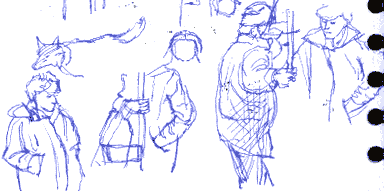
|
|
Precinct Patrol
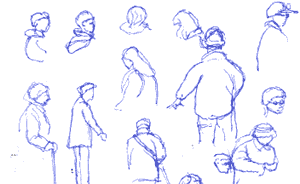 I
planned these Drawing in the City workshops to be the kind of
drawing experience that I'd most enjoy: I
planned these Drawing in the City workshops to be the kind of
drawing experience that I'd most enjoy:
-
meet in a café
-
go out somewhere with loads of lively stuff to draw: people, pigeons,
statues, stalls . . .
-
enjoy the company of a group of fellow sketchers
-
have the support of an expert (that's supposed to be me) on hand
to give encouragement and, if necessary, advice
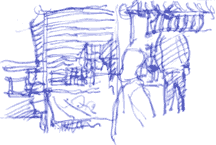 Come
to think of it, I seem to have the model of the A.A. (the Automobile Association,
that is) in mind; a set-up where individuals roam around enjoying doing
their own thing but have the peace of mind of a touring patrolman as a
back up, in case they get into difficulties. Come
to think of it, I seem to have the model of the A.A. (the Automobile Association,
that is) in mind; a set-up where individuals roam around enjoying doing
their own thing but have the peace of mind of a touring patrolman as a
back up, in case they get into difficulties.
That's fine if you assume that everyone is already a confident, qualified
driver but today I've got a whole variety of sketchers:
-
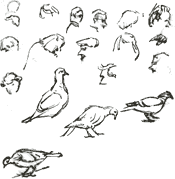 young
students who're just starting out and want drawing experience young
students who're just starting out and want drawing experience
-
people who've painted (as a hobby) for years but now want
to improve their drawing
-
people who are coming back to drawing after a long, long break
- people who've never drawn but have taken up art recently
A Face in the Crowd
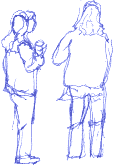 The
cold, especially in the chill breeze, is one problem; finding my students
in the bustle of a Saturday shopping crowds is another. Even with the
help of the security guards in the Ridings Centre (who tell me they've
just seen one of my students near the main entrance) I fail to spot a
single sketcher amongst the thousands of shoppers. The
cold, especially in the chill breeze, is one problem; finding my students
in the bustle of a Saturday shopping crowds is another. Even with the
help of the security guards in the Ridings Centre (who tell me they've
just seen one of my students near the main entrance) I fail to spot a
single sketcher amongst the thousands of shoppers.
My hardier students who are braving the cold and sitting on the benches
by the cathedral are easier to keep track of and I draw some of them because
I realise with 12 new faces today that's going to be a good way of remembering
who's who. I also like to tie people to the sort of drawings they do.
Then I really remember them.
Drawing the Crowds
I like the natural poses adopted by the people on the precinct visiting
the farmers' market. I prefer these real life poses to
the ones you're likely to get in a life drawing class. Life class poses
can be rather static. I also like the body language of my students while
they're drawing; they create a little island of concentration around themselves.
Even seen from behind, it's obvious that they're wrapped up in their work.
I feel that drawings of people seen from behind can often be more expressive
than people (in a group photograph for example) seen face on.
|
|
|
|
| Katie drawing an archway |
drawing the cathedral entrance |
Elisabeth drawing the cathedral reflected in a store front across
the precinct |
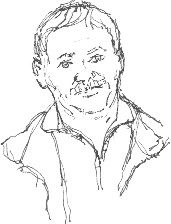 'Constructive
Criticism' 'Constructive
Criticism'
I seem to have been chasing my flock around like a trainee sheepdog all
afternoon so at the end of the day I ask how they think the course might
be improved. What they'd like is:
-
Constructive criticism, to know if they're on the right track with
their drawing
-
Some instruction and advice on how to approach subjects; after all,
they can practice drawing on their own any time
Number 1 is difficult for me because I tend not to be critical at all.
I might see one or two technical faults in a beginner's drawing but -
if they're really trying to see the world around them and to
capture something of it - then I genuinely think that they've produced
a worthwhile drawing. They've learnt something from it. Experienced something.
I simply want to encourage them to go out and draw and draw and draw.
 How
not to draw How
not to draw
As for demonstrations: with me they invariably go wrong!
I need to be focused as I draw: if I try to talk about it
at the same time I step out of that state of mind where the most important
thing in the world is the exact appearance of the subject in front of
me.
Centre of Attention
In fact I don't even like the word 'subject' - ideally you
try to become so absorbed in what you're doing that you forget that you're
an 'artist', a 'critic', a campaigner for the homeless or whatever, and
you feel a oneness with the world around you. You need to be relaxed and
aware but not analytical in a cold, detached sense.
Drawing on Experience
 This
is very difficult to put over in a demonstration! You've just got to experience
it for yourself to know what it's all about. That's why I want them to
spend the whole workshop drawing with as little distraction from me as
possible. This
is very difficult to put over in a demonstration! You've just got to experience
it for yourself to know what it's all about. That's why I want them to
spend the whole workshop drawing with as little distraction from me as
possible.
Drawing might be a natural thing for me but to demonstrate it is like
trying to demonstrate and describe in detail how I walk - I'm inevitably
going to trip over. In other words the demonstration is always going to
turn out to be of how NOT to draw. (Press your refresh
button to reanimate this character)
Art Café
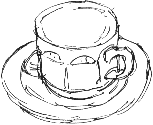 This
is where the café atmosphere - noisy and cramped as it is - seems
more amenable than the quieter, calmer but more imposing alternative of
the ro0m at the art gallery which we could have used. I wish they'd reopen
the old Elizabethan Gallery, in the old grammar school overlooking the
market, as a spacious art café with elbow-room for sketching, informal
exhibitions by local artists . . . and perhaps a piano in the corner. This
is where the café atmosphere - noisy and cramped as it is - seems
more amenable than the quieter, calmer but more imposing alternative of
the ro0m at the art gallery which we could have used. I wish they'd reopen
the old Elizabethan Gallery, in the old grammar school overlooking the
market, as a spacious art café with elbow-room for sketching, informal
exhibitions by local artists . . . and perhaps a piano in the corner.
We're sitting around a couple of tables in the best alternative - the
busy Café Nero overlooking the precinct - thawing
out with a coffee at the end of the day's sketching. As I said on Tuesday,
I think this is such an essential part of my workshop; a time to relax
and reflect on the day.
Portrait of a Student
'All right then,' I say recklessly, 'I'll do you a demonstration right
now.'
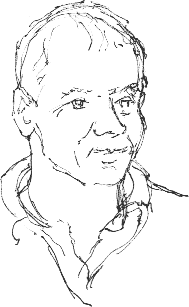 As
Alan is one of those who requested the demonstration,
he's got the dubious privilege of being the person I'm going to draw. As
Alan is one of those who requested the demonstration,
he's got the dubious privilege of being the person I'm going to draw.
As I'd warned them, it doesn't turn out too well but it does demonstrate
that:
-
I start at the top and work down; that way I can
see what I've just drawn and relate the next bit I draw to it.
-
Spaces - from the top of the head to the eyes, between
the eyes and from ear to eye and mouth, to give three examples - are
as important as details such as eyes and nose (which also need careful
observation)
-
That you should go back and correct mistakes - the
top of the head in this example - and not worry about leaving the
corrections visible as a part of the drawing
Inevitably Alan laughs while I'm drawing so (that's my excuse) but his
companions say I've caught something of his appearance.
Party People
|
|
I've got another chance to draw people
in the evening as we meet with a group of old friends. Well, I say
old but Felicity (left) and Judy
(right) hardly seem to have changed in appearance and certainly
not in character since I drew them 25 years ago when I first met
Barbara and her group of friends.
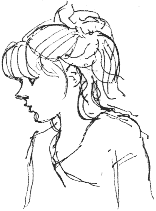 It
would be impossible to do a bad drawing of Lydia.
Her mum tells me that one of Lydia's favourite books for bedtime
reading is my Deep in the Wood. Now there's a child with
good taste. It
would be impossible to do a bad drawing of Lydia.
Her mum tells me that one of Lydia's favourite books for bedtime
reading is my Deep in the Wood. Now there's a child with
good taste.
Sally, who I drew on Tuesday, is Lydia's aunt. Wakefield seems
like a small place sometimes.  |
|
Richard Bell, richard@willowisland.co.uk
|
![]()